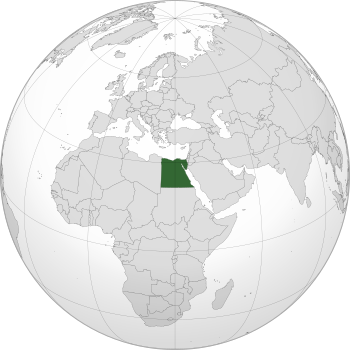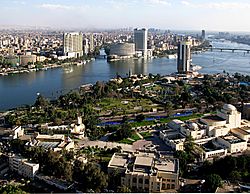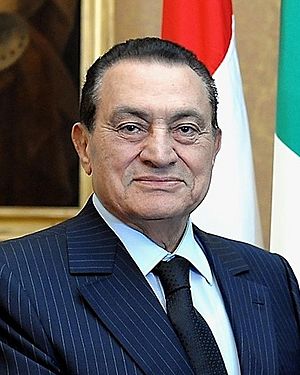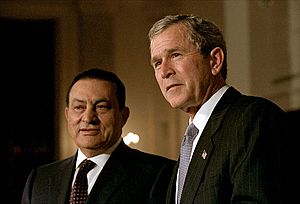History of Egypt under Hosni Mubarak facts for kids
The history of Egypt under Hosni Mubarak covers 29 years. It started in 1981 when President Anwar Sadat was assassinated. It ended with the 2011 Egyptian Revolution in January 2011. During this time, Mubarak was removed from power by a large public uprising. This event was part of a bigger movement called the Arab Spring.
Mubarak continued many of the policies of the president before him. These included making Egypt's economy more open and sticking to the 1979 Camp David Accords. Egypt also stayed close with other countries in the Arab League, as well as the United States, Russia, and India.
However, groups like Amnesty International often criticized his government. They were concerned about how people's rights were treated in Egypt.
Mubarak's time as president had a big impact on Egypt. This was because the president had to approve all new laws and government spending.
Contents
Egyptian Politics Under Mubarak
Quick facts for kids
Arab Republic of Egypt
|
|||||||||||
|---|---|---|---|---|---|---|---|---|---|---|---|
| 1981–2011 | |||||||||||
|
Anthem: "Bilady, Bilady, Bilady"
"بلادي، بلادي، بلادي" (English: "My country, my country, my country") |
|||||||||||
 |
|||||||||||
| Capital and largest city
|
Cairo | ||||||||||
| Official languages | Arabic | ||||||||||
| Common languages | Egyptian Arabic | ||||||||||
| Religion | Islam | ||||||||||
| Demonym(s) | Egyptian | ||||||||||
| Government | Unitary semi-presidential republic under an authoritarian dictatorship | ||||||||||
| President | |||||||||||
|
• 1981
|
Sufi Abu Taleb (acting) | ||||||||||
|
• 1981–2011
|
Hosni Mubarak | ||||||||||
| Prime Minister | |||||||||||
|
• 1981–1982 (first)
|
Hosni Mubarak | ||||||||||
|
• 2011 (last)
|
Ahmed Shafik | ||||||||||
| Legislature | Parliament | ||||||||||
| History | |||||||||||
|
• Assassination of Anwar Sadat
|
6 October 1981 | ||||||||||
|
• Mubarak Becomes President
|
14 October 1981 | ||||||||||
|
• Luxor massacre
|
17 November 1997 | ||||||||||
|
• 2005 Egyptian presidential election
|
7 September 2005 | ||||||||||
| 25 January 2011 | |||||||||||
| Area | |||||||||||
|
• Total
|
1,010,408 km2 (390,121 sq mi) | ||||||||||
| Population | |||||||||||
|
• 1981
|
41,706,000 | ||||||||||
|
• 1989
|
50,900,000 | ||||||||||
|
• 1999
|
62,600,000 | ||||||||||
|
• 2011
|
80,500,000 | ||||||||||
| Currency | Egyptian pound | ||||||||||
| ISO 3166 code | EG | ||||||||||
|
|||||||||||
Hosni Mubarak became Egypt's President after Anwar Sadat was assassinated on October 6, 1981. A few weeks later, this was made official by a vote in the People's Assembly. Before this, Mubarak had been the Vice President since 1975. He had also risen through the ranks of the Egyptian Air Force.
Political changes were limited during Mubarak's rule. Before 2005, other candidates were not allowed to run for President. The president's position was simply confirmed every six years by the People's Assembly. This changed on May 25, 2005. A new rule allowed the president to be chosen by the Egyptian people through elections.
Presidential elections were held four months later. Mubarak won with almost 89% of the votes against two other candidates. To be on the ballot, a candidate needed support from a political party. They also needed approval from a national election group. Some opposition groups asked people to not vote in the referendum, but it still passed with over 80% approval.
The opposition parties in Egypt were often weak and divided. In the November 2000 elections, only 34 opposition members won seats in the 454-seat assembly. The ruling National Democratic Party (NDP) had a clear majority. The Muslim Brotherhood, a group founded in Egypt in 1928, was not allowed to be a political party. This was because Egyptian law did not allow political parties based on religion. However, members of the Brotherhood were known publicly and could speak their minds. Some members were even elected to the People's Assembly as independent candidates.
Other opposition groups included Kefaya and the April 6 Youth Movement. These groups were less organized than official political parties. Bloggers, or "cyberactivists," also played a role. They wrote, organized, and helped gather public opposition.
President Mubarak had strong control over Egypt. Support for Mubarak and his economic plans dropped. This happened as news came out about his son, Gamal, gaining influence in the ruling party and government.
Egypt's Foreign Relations
Mubarak kept Egypt's promise to the Camp David peace process. He also worked to improve relations with other Arab countries. In January 1984, Egypt rejoined the Organisation of Islamic Cooperation. In 1989, Egypt was readmitted to the Arab League. Egypt also played a calm role in international groups like the United Nations.
Under Mubarak, Egypt was a strong friend of the United States. The U.S. gave Egypt about $1.5 billion each year after the 1979 Camp David Peace Accords. Egypt was part of the group of countries that fought in the 1991 Gulf War. Egyptian soldiers were among the first to arrive in Saudi Arabia. They helped remove Iraqi forces from Kuwait. The U.S. government saw Egypt's help as very important. It helped get more Arab support for freeing Kuwait.
Even though many Egyptians did not like it, Egypt's involvement in the war brought money to the government. Reports said that Egypt received large sums of money or had its debts forgiven. For example, America and other countries forgave about $14 billion of Egypt's debt after the war.
Egypt also helped solve problems between Syria and Turkey in 1998. This dispute was about borders and water.
Mubarak did not support the 2003 invasion of Iraq by the U.S. He believed that the conflict between Israel and Palestine should have been solved first. In 2009, Mubarak stated that Egypt would not be part of any American nuclear protection plan for Gulf countries. This was in response to concerns about Iran's nuclear activities.
Challenges and Unrest
Unrest was common during Mubarak's time in power. In February 1986, the Central Security Forces protested for better pay. They caused riots and looting in the streets. This uprising was the biggest challenge Mubarak had faced so far. It was only the second time in modern Egyptian history that the army was sent to the streets to restore order.
In 1992, 14,000 soldiers entered the Cairo area of Imbaba. They stayed for six weeks, arresting many people. This happened after a group tried to take control there. In the years that followed, this group caused more problems for the government and foreigners.
During 2007 and 2008, Egypt saw more than 150 protests and strikes. Some of these were violent and needed many security forces to control them.
Human Rights Concerns
A state of emergency was in place throughout Mubarak's entire presidency. This law allowed for people to be held without fair trials. Human rights groups like Amnesty International said that violations by Egyptian security forces were "systematic."
Freedoms of speech, association, and assembly were limited under Mubarak. Laws about the press and publications controlled what could be printed. They also called for fines or jail time for those who criticized the president.
Egypt's Economy

Starting in 1991, Mubarak began a big plan to change Egypt's economy. He wanted to make the government's role smaller and the private sector's role bigger. In the 1990s, agreements with the International Monetary Fund helped Egypt's economy. Also, a lot of Egypt's debt was forgiven because of its help in the Gulf War. This helped Egypt's economic performance.
In the last 20 years of Mubarak's rule, inflation went down. From 1981 to 2006, the country's economic output per person grew four times. However, this growth was not spread equally among everyone. Changes to the money system and tax system, along with cuts in government social spending, caused difficulties for most people. Housing became more scarce and expensive. It became common for large families to live in a single room. In many homes, family members had to take turns sleeping on the same beds.
In 1989, early in Mubarak's time, wealth was not shared equally. About 2,000 families had high incomes, while over 4 million people earned very little.
Social conditions in Egypt improved, but modernization did not reach everyone. Some recent gains were lost due to rising food and fuel prices in 2008. The World Bank noted that infant deaths and child malnutrition decreased by half. Life expectancy also increased from 64 to 71 years. Living standards improved for most people, but not evenly. About 18% of Egyptians lived below the poverty line. This number went up to 40% in rural Upper Egypt.
According to an article in The Seattle Times in January 2011, about half of Egypt's population lived on $2 a day or less.
Government Corruption
During Mubarak's time, corruption in the government's Ministry of Interior increased. This was because the government gained more power to keep the president in office for a long time. This corruption led to political figures and young activists being held without trials. There were also hidden detention places that were not officially recorded. People were also denied jobs in universities, mosques, and newspapers based on their political views.
Society and Education
In 1986, a census found Egypt's population to be 50.4 million. About 2.3 million Egyptians worked in other countries. More than 34% of the population was 12 years old or younger. About 68% were under the age of 30. Fewer than 3% of Egyptians were 65 or older. Like many developing countries, people moved from rural areas to cities. However, just over half the population still lived in villages. In 2010, The Economist reported that three-quarters of Egyptians lived in urban areas. This was because many large villages were not officially classified as towns.
In 1989, the average life expectancy was 59 for men and 60 for women. The infant mortality rate was 94 deaths per 1,000 births. A 2010 survey showed that 93% of Egyptians in villages complained about a lack of proper sewage. The same survey showed that 85% of Egyptian homes did not have garbage service. This led people to burn their trash, dump it in streets or canals, or let animals eat it. Visitors to Egypt often noticed the "grubbiness" of the streets. The World Bank estimated that about 16 million Egyptians lived in informal settlements. Almost all Egyptian homes had electricity and piped water. However, the quality varied greatly. Poor homes often had only a few hours of electricity per day and irregular, polluted water. This led to high rates of kidney diseases.
A law passed just before Mubarak became president made nine years of public education mandatory. Despite this, most parents took their children out of school before they finished ninth grade. The basic school cycle included six years of primary school. After passing special exams, students could go to three years of intermediate school. Another set of special exams allowed entry to the non-mandatory secondary cycle (grades 10-12). Secondary students could choose between a general curriculum (for college preparation) or a technical curriculum. Students could only move up grades after getting good scores on standardized tests.
Like in many poorer countries, fewer girls than boys were enrolled in school. In 1985–86, only 45% of all primary students were girls. An estimated 75% of girls aged six to twelve were in primary school, compared to 94% of boys. In Upper Egypt, less than 30% of all students were girls. Girls also left primary school more often than boys. Girls made up about 41% of intermediate school enrollment and 39% of secondary school enrollment. Among all girls aged twelve to eighteen in 1985–86, only 46% were in school.
Mubarak's Overthrow
Mubarak was removed from power after 18 days of protests. These protests were part of the 2011 Egyptian revolution, which started on January 25. On February 11, Vice President Omar Suleiman announced that Mubarak had resigned. Authority was then given to the Supreme Council of the Armed Forces. On April 13, a prosecutor ordered Mubarak and his two sons to be held for questioning. This was about claims of corruption and misusing power. He was later ordered to stand trial for charges related to the deaths of peaceful protestors during the revolution.
See also
- 2011 Egyptian revolution
- Hosni Mubarak
- Liberalism in Egypt
- Terrorism in Egypt
 | Chris Smalls |
 | Fred Hampton |
 | Ralph Abernathy |







